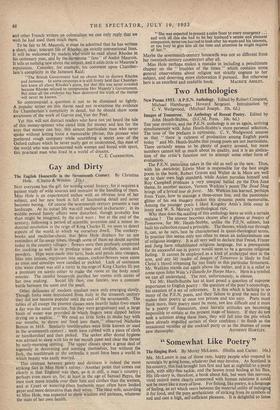Gay and Dirty
The English Housewife in the Seventeenth Century. By Christina Hole. (Chatto & Windus. 21s.)
NoT everyone has the gift for writing social history, for it requires a patient study of wide sources and restraint in the handling of them. Miss Hole is an experienced author with an obvious love of her subject, and her new book is full of fascinating detail and never becomes boring. Of course the seventeenth century presents a vast landscape. At its outset life was still mediaeval in character ; in its middle- period family affairs were disturbed, though probably less than might be imagined, by the civil wars ; but at the end of the century, following a period of scientific invention and a minor in- dustrial revolution in the reign of King Charles II, we seem to detect aspects of the world. in which we ourselves dwell. The cookery- books and medicine-chests that Miss Hole displays for us are reminders of far-away times, though some of them no doubt survive today in the country villages ; flowers were then profusely employed for cooking as well as to produce wines and cordials, scents and powders. Hips. were made into tarts, buds and petals into vinegars, lilies into lotions, marjoram into sauces, cuckoo-flowers were eaten as cress and cowslips were candied or pickled. Lack of sanitation (the water closet was still a rarity in the reign of King Charles II) put a premium on scents either to make the room or the body smell sweeter. The careful housewife purified her rooms with scents of
her own making. Social life then, one fancies, was a constant battle between the scent and the smell.
Other delicacies of modern conduct were only emerging slowly. Though forks were introduced from Italy in the sixteenth century they did not become popular until the end of the seventeenth. The tables of all except the poorest classes were heavily laden (two meals a day was the usual practice, but they were gargantuan) and a large basin of water was provided in which fingers were dipped before drying on a napkin.. " We need no little forks to make hay with our mouths, to throw our food into them," observed Nicholas Breton in 1618. Similarly toothbrushes were little known or used in the seventeenth century ; teeth were rubbed with a piece of cloth or handkerchief and then picked. The seeker after dental hygiene was advised to sleep with his or her mouth open and clear the throat by early-morning spitting. The upper classes spent a great deal of ingenuity in decorating and scenting themselves, but without the fork, the toothbrush or the umbrella it must have been a world in which beauty was easily marred.
This contrast between gaiety and dirtiness is indeed the most striking fact in Miss Hole's survey. Another point that comes out clearly is that England was then, as it is still, a man's country ; perhaps even more so, for, at least in the age of Samuel Pepys, the men took more trouble over their hats and clothes than the women, and at Court or watering-place husbands must often have looked gayer and more decorative than their wives. The ideal wife, according to Miss Hole, was expected to show wisdom and patience, whatever the state of her own health.
" She was expected to present a calm front to every emergency ..'. and with all this she had to be her husband's serene and pleasant companion, never too hurried to look after his wants and his interests, or too busy to give him all the time and attention he might require of her."
Maybe the seventeenth-century housewife was not so different from her twentieth-century counterpart after all.
Miss Hole perhaps makes a mistake in including a penultimate chapter on the " troubles of the times " which contains some. general observations about religion not strictly cognate to her subject, and deserving more elaboration if pursued. But otherwise
hers is an excellent and readable book. MAURICE ASHLEY.


































 Previous page
Previous page